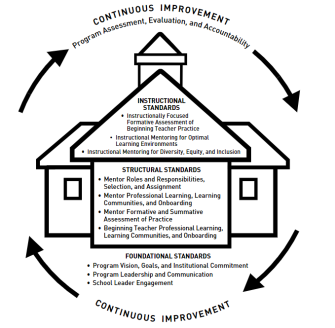
The New Teacher Center, a long-running teacher-induction program that works with nearly 1 in 10 new teachers, has released its program standards to the public. Up until now, those standards have only been available to paying districts.
The NTC’s approach has been backed up by research—a recent independent study found that if new teachers are paired with high-quality, trained mentors and receive frequent feedback for two years, their students outperform their peers in both English/language arts and mathematics. Those students received the equivalent of up to five months of additional learning. Another study found that new teacher retention in one N.C. district increased by 31 percent after two years of NTC support.
The newly released program standards are meant to be an aspirational framework for program design, implementation, and evaluation for district educators, researchers, and policy makers alike. Some key points: Teachers need mentorship and training for the first two or three years of their career. Mentors need continuing access to ongoing professional learning, just like new teachers do. Formative assessments should guide both the mentor and the development of the new teacher. And induction programs should have a focus on equity for all students.
While every school district has some sort of training for its new teachers, what that looks like in practice varies wildly, said Lynn Kepp, the senior vice president for strategic partnerships at the NTC. Some districts have two days of onboarding, while others have meaningful mentoring that lasts for a couple years, she said.
These standards, Kepp said, seek to “help the field look at what really could be and should be the components of the program.”
The New Teacher Center believes induction programs should incorporate diversity, equity, and social-emotional learning, and that there should be an explicit instructional focus on meeting the needs of every learner, said Jenny Morgan, the vice president for product development.
“We’ve moved away from this idea that you’ve got to get classroom management under your belt before you tackle instruction,” Morgan said. “Teachers need to be ready [to deliver content] the first time they’re in front of kids.”
Too often, Kepp said, new teacher support programs focus solely on the teachers getting used to teaching. While that’s still essential, she said, the NTC standards also focus on student learning.
“The outcome is not, did the teacher feel great? That’s part of it, but the real question is, did that instruction help student learning?” she said.
A well-designed induction program, Kepp said, will teach teachers the basics of pedagogy and classroom management at the same time as content standards and meeting students’ social-emotional needs.
The standards should also be rooted in a cycle of continous improvement. Here’s the NTC’s graphic of how the program standards should be approached—clear goals for the program and school leader support are the foundation:

“We’re just hoping that programs will take time to review these standards and think about what they’re doing to support the needs of their newest teachers,” Kepp said. “We’re going to continue to put things out in the field. ... We have a lot of research and information to help them get better, faster.”
The board of the NTC is currently looking for a new chief executive officer, after founder Ellen Moir announced she plans to retire this summer. The New Teacher Center is celebrating its 20th anniversary this year.
Image: Photo of a new teacher and an induction coach in Cedar Rapids, Iowa -- Liz Martin for Education Week/File. Graphic courtesy of the New Teacher Center.



